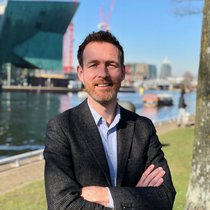AMS Institute is a unique transdisciplinary urban innovation ecosystem, rooted in its founding institutes TU Delft, Wageningen University & Research, and MIT, and shaped by its partnership with the City of Amsterdam.
As a thought leader, accelerator, and learning community, we develop groundbreaking scientific insights, imaginative solutions, and impactful technologies. We research critical and interconnected challenges in mobility, energy, circularity, digitalization, food and climate adaptation to accelerate the development of tangible metropolitan solutions.
“At AMS Institute we focus on research with impact. These urban challenges are complex and multifaceted and require a combination of diverse expertise and perspectives to create feasible and meaningful solutions”
Stephan van Dijk
Director of Innovation
We research, design and share metropolitan solutions
We research critical and interconnected challenges in mobility, energy, circularity, digitalization, food and climate adaptation to accelerate the development of tangible metropolitan solutions.
Directly jump to our project portfolios per urban challenge: Smart Urban Mobility | Urban Energy | Climate Resilient Cities | Circularity in Urban Regions | Metropolitan Food Systems | Responsible Urban Digitization
Some of our projects
We generate and foster talent
Knowledge is essential in developing a deep understanding of – and sustainable solutions for – our cities of today and tomorrow, and it’s equally important to educate, attract talent and disseminate knowledge to benefit the Amsterdam Metropolitan area. Our master Metropolitan Analysis Design and Engineering – a joint degree WUR/TUD program is at the heart of our educational activities. Next to the master program, we offer a wide portfolio of education activities, such as the AMS Academy for Professional Education, summer schools and online education via MOOCs.
We stimulate entrepreneurship
All our research & educational activities and collaborations create new windows opportunities. Ideas for next steps and startups, that just need to see the light of day! With the AMS Startup Booster we propel innovative ideas, create impact through strategic collaborations within our network, and stimulate entrepreneurship.
In this pre-incubation program, we aim to help the next generation of ambitious urban and sustainable startups with their next steps to turn ideas into reality. Ideas resulting from the Msc MADE curriculum, our research activities, but also external startup ideas looking for the right eco-system and a place to grow and develop their business models. Next to running our own startup program, we also contribute to various others startup programs we are connected to, such as the EIT Urban Mobility Accelerator program.
We build partnerships and collaborations
Collaboration is key in finding metropolitan solutions: it grows a deeper and interdisciplinary understanding of the topics at hand and sparks creativity in exploring them. AMS Institute is a networking organization that works with a broad coalition of stakeholders, including academic researchers, industry, civil society, policy makers, and all organizations part of the urban innovation community. The unique partnership with the Municipality of Amsterdam and the Metropolitan Area (AMA), is at the core of AMS Institute.
We bring together the interdisciplinary nature of our three founding universities
AMS Institute was founded in 2014 by three universities: Delft University of Technology (TU Delft), Wageningen University & Research (WUR) and Massachusetts Institute of Technology (MIT).
It’s exactly the combination of expertise and interdisciplinary nature of the three founding universities combined, what makes AMS Institute uniquely positioned to research, design and propel urban innovation.
“The AMS Institute eco-system of scientists, lectures, students and staff is the biggest asset and foundation of our institute. They are our thriving community that create the ideas, talent, collaborations and solutions to re-invent cities.”
Zwanet van Lubek
Managing Director

